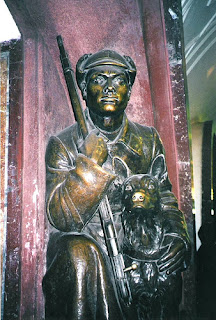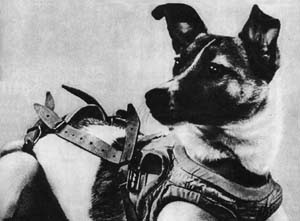 A few weeks ago, Leslie and I were standing at the crosswalk waiting for the light to change. As we patiently awaited the signal, a stray dog casually walked up to us and sat down. When the light changed, he stood up and crossed the street before taking a left and continuing up the sidewalk. While this may seem strange to people in most countries, in Moscow it is a common occurrence. Therefore, I would like to reveal to the world the truth about one rarely mentioned aspect of the former Soviet Union, namely, its treatment of canines and their elevation to a place of envy amongst all of the dogs in the world.
A few weeks ago, Leslie and I were standing at the crosswalk waiting for the light to change. As we patiently awaited the signal, a stray dog casually walked up to us and sat down. When the light changed, he stood up and crossed the street before taking a left and continuing up the sidewalk. While this may seem strange to people in most countries, in Moscow it is a common occurrence. Therefore, I would like to reveal to the world the truth about one rarely mentioned aspect of the former Soviet Union, namely, its treatment of canines and their elevation to a place of envy amongst all of the dogs in the world.On November 7, 1917 the entire world stood in awe of an earth shattering event. The turmoil and strife caused by the first World War had allowed for a group of political radicals to seize power in Russia. Promising to create a world free of exploitation and subjugation, they set the stage for the most ambitious social experiment in world history. People from around the world made their way to Moscow to contribute their services to the cause. It was as a part of this pilgrimage, that a group of dogs from Scotland and Germany united to form a lobbying group for their interests. Their appeals made their way to all of the belligerent countries, and it was not long before a small coalition had formed. By late November, the dogs had enough bones to pay for steamer fare. They arrived in St. Petersburg in time to present their platform to the entire Communist movement.
The dogs had a difficult road ahead of them. There was a vocal anti-dog faction within the Bolshevik party. Fortunately, Vladimir Lenin was a firm supporter for Dogs rights.
 In his widely read treatise, "Собаки и Народ, Ровня?" (Dogs and the People, the Same?), Lenin spelled out his beliefs concerning the inalienable rights of all dogs within a Socialist framework. Lenin's strong personality was not enough to get the equal rights amendment passed. This coupled with the impending Civil War forced many of the dogs to flee the country. Unfortunately, the movement of dogs toward Moscow had caused many western governments (including the United States) to pass harsher laws restricting the rights of K-9's within their borders. Many of the returning dogs were collared by local authorities as soon as the entered their native countries. The small and vocal minority of dogs that remained in Russia watched all of these events in horror. Realizing that their only hope for equality remained in Russia, they hastily prepared a new manifesto and presented it to the Communist Party. Once again backed by Lenin, the uphill struggle for dog equality was renewed. The stage was set for the greatest triumph in the recorded history of the species.
In his widely read treatise, "Собаки и Народ, Ровня?" (Dogs and the People, the Same?), Lenin spelled out his beliefs concerning the inalienable rights of all dogs within a Socialist framework. Lenin's strong personality was not enough to get the equal rights amendment passed. This coupled with the impending Civil War forced many of the dogs to flee the country. Unfortunately, the movement of dogs toward Moscow had caused many western governments (including the United States) to pass harsher laws restricting the rights of K-9's within their borders. Many of the returning dogs were collared by local authorities as soon as the entered their native countries. The small and vocal minority of dogs that remained in Russia watched all of these events in horror. Realizing that their only hope for equality remained in Russia, they hastily prepared a new manifesto and presented it to the Communist Party. Once again backed by Lenin, the uphill struggle for dog equality was renewed. The stage was set for the greatest triumph in the recorded history of the species.The Civil War in Russia forced the dogs into a tight spot. The country had sunk into a level of depravity never before seen, and it was hard for both dogs and people to feel safe. Seeing the revolution (and their future) in trouble, many dogs joined the red cause. Their tenacity coupled with their dogged loyalty to the cause, left a positive impression on many of the leading Communists. In 1921, with the fighting beginning to ebb, Lenin finally resubmitted the call for dog equality. The vote was almost unanimous. The People's Official and Original Charter for Hounds, or P.O.O.C.H. was officially put into effect on March 15, 1923. A type of euphoria swept the entire canine community, but it would only be temporary. A series of strokes had permanently debilitated their chief benefactor. In January 1924, Lenin died and the second phase of the struggle for true dog-man equality commenced.
 Lenin's death helped propel Joseph Stalin, then General Secretary within the party, to the top of the leadership pool within the Soviet Union. Stalin, who had been in the dog house ever since supporting the motion against P.O.O.C.H., decided to make the repeal of the legislation his chief priority. Despite this, the dogs were not about to roll over and play dead. They mounted an effort against the new leader. Joining Trotsky's "Left Opposition", the dogs would angrily bark down any supporters of the General Secretary. Despite this, Stalin's place became more and more secure. The fall of Trotsky in 1926, led to an even tighter leash on dog activities in the Soviet Union. The "Collectivization" campaign during the 1930's further eroded the rights of dogs to the point that they were forced to beg for strips of land, while still unable to bring home the bacon for their families. In 1939, P.O.O.C.H. was repealed. The dogs were in a daze at their misfortune. They entered the 1940's with their tales between their legs and very little hope for the future.
Lenin's death helped propel Joseph Stalin, then General Secretary within the party, to the top of the leadership pool within the Soviet Union. Stalin, who had been in the dog house ever since supporting the motion against P.O.O.C.H., decided to make the repeal of the legislation his chief priority. Despite this, the dogs were not about to roll over and play dead. They mounted an effort against the new leader. Joining Trotsky's "Left Opposition", the dogs would angrily bark down any supporters of the General Secretary. Despite this, Stalin's place became more and more secure. The fall of Trotsky in 1926, led to an even tighter leash on dog activities in the Soviet Union. The "Collectivization" campaign during the 1930's further eroded the rights of dogs to the point that they were forced to beg for strips of land, while still unable to bring home the bacon for their families. In 1939, P.O.O.C.H. was repealed. The dogs were in a daze at their misfortune. They entered the 1940's with their tales between their legs and very little hope for the future.The Second World War put Soviet canines in a tough situation. They could side with their German brethren then under the grip of fascism or support the state that had fallen so far from its original ideals. Fearing the possibility of digging themselves deeper into a hole, they decided to throw their support behind the Red Army. The war cost many lives and the ineffective leadership forced many dogs into a corner. Despite this, the German invasion caused a feeling of patriotism that aroused a rabid defense. The end of the war caused a return to pre-war conditions, but now many dogs (and some people) were howling for a new form of legislation to guarantee their rights. Despite this Stalin remained steadfast. It would not be until his death in 1953 that the dogs would finally receive their just dessert.
Stalin's death caused a renewal of efforts to guarantee dog equality. Fetching copies of the old legislation, the dogs presented Khrushchev with the necessary framework for a new bill. In 1956, B.A.R.K. (Bill for Animal Relief and Kindness) was passed. No longer just chasing their tales, they continued to advance in society. I
 n 1957, a dog named "Laika" was the first animal in space. (I would like to remind the readers that Laika is also the longest formerly living animal still in space) Throughout the duration of the Soviet Union, dogs would receive ample pensions, while being treated to some of the best parks the country could afford. Naturally, this would all come crashing down in 1991.
n 1957, a dog named "Laika" was the first animal in space. (I would like to remind the readers that Laika is also the longest formerly living animal still in space) Throughout the duration of the Soviet Union, dogs would receive ample pensions, while being treated to some of the best parks the country could afford. Naturally, this would all come crashing down in 1991.The collapse of the Soviet Union caused an immense amount of strife for everyone residing within its borders. For dogs, its not been much different. They have taken to traveling in packs, scrounging for food, and begging for handouts. They have even begun to resemble strays in many other countries, listless and unmotivated. Critics of Russia's new course have blamed the rampant speculation and unchecked capitalism. Unfortunately there is no way of knowing for sure. The one thing that is certain is that dogs have become animals in the land that they once ruled. Despite this, there still remain glimpses of their past in many of their present actions. There constant presence in metros, their adherence to important traffic rules and naturally their willingness to submit to the lowest strata of society, have more than proven their civility and cultivation. It is from this species that we should look for our next period of enlightenment. If we don't, we will be nothing more than mongrels, nipping on the heals of actual progress.
 This week while watching Russian television, I stumbled on MTV. While this error would elicit a quick and thorough attempt to either destroy the television, or at the very least, change the channel, I hesitated due to the fact that I saw a music video. Now as many of you know, MTV is a cancer that infects all that encounters it. Filled with the most banal trash ever viewed, it was the only channel that I programmed out of my TV at home, such were my fears of even viewing a nanosecond of some reality show or worse. Unfortunately, since I'm in Russia, I was sucked into what appeared to be shadow of its past relevance, and decided to stay and see if perhaps it was different here. It was at this moment, that this error began to bear fruit. I saw a video by an "artist" called Rihanna featuring Jay-Z. Now many of you may fault me for what happened next based on the argument that I should have expected what would happen just from the name "Jay-Z." I can only say that hindsight is 20-20, plus Rihanna looked attractive. Anyway, I was thrown into an abyss of crap of which I can't adequately relate in words. The "song", titled "Umbrella," was her just gyrating to the semblance of a beat, while repeating the word "umbrella." After two to three minutes of this, it ended, my ears accosted to the point that I feared I would be incapable of listening to music again. It was at that moment that I realized that the "dark ages" of music that we have had the misfortune to live in, had at last reached a new, frightening level. Music, the medium believed to be a direct gift from God, had finally and irrevocably decided to cut its ties with its chief mode of appreciation, the ear.
This week while watching Russian television, I stumbled on MTV. While this error would elicit a quick and thorough attempt to either destroy the television, or at the very least, change the channel, I hesitated due to the fact that I saw a music video. Now as many of you know, MTV is a cancer that infects all that encounters it. Filled with the most banal trash ever viewed, it was the only channel that I programmed out of my TV at home, such were my fears of even viewing a nanosecond of some reality show or worse. Unfortunately, since I'm in Russia, I was sucked into what appeared to be shadow of its past relevance, and decided to stay and see if perhaps it was different here. It was at this moment, that this error began to bear fruit. I saw a video by an "artist" called Rihanna featuring Jay-Z. Now many of you may fault me for what happened next based on the argument that I should have expected what would happen just from the name "Jay-Z." I can only say that hindsight is 20-20, plus Rihanna looked attractive. Anyway, I was thrown into an abyss of crap of which I can't adequately relate in words. The "song", titled "Umbrella," was her just gyrating to the semblance of a beat, while repeating the word "umbrella." After two to three minutes of this, it ended, my ears accosted to the point that I feared I would be incapable of listening to music again. It was at that moment that I realized that the "dark ages" of music that we have had the misfortune to live in, had at last reached a new, frightening level. Music, the medium believed to be a direct gift from God, had finally and irrevocably decided to cut its ties with its chief mode of appreciation, the ear.


